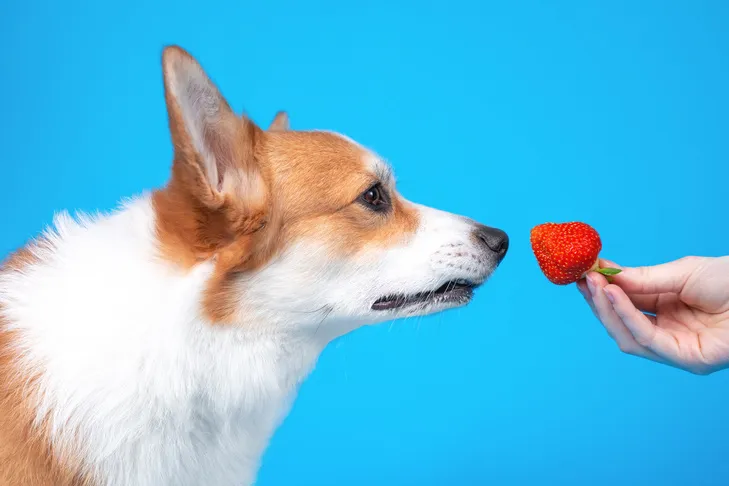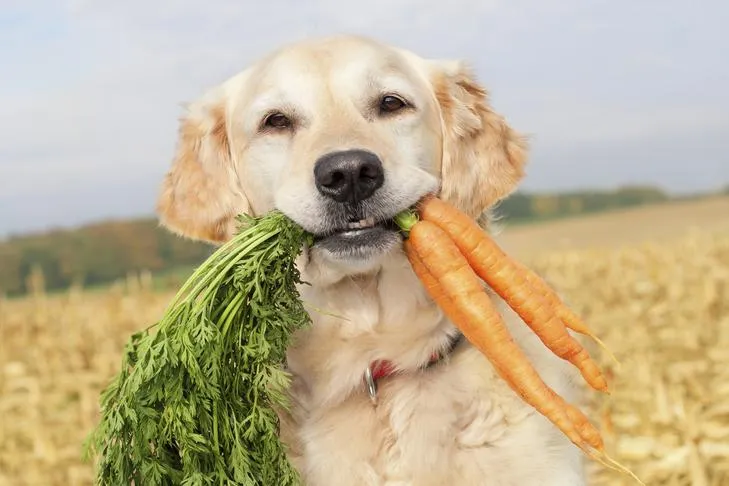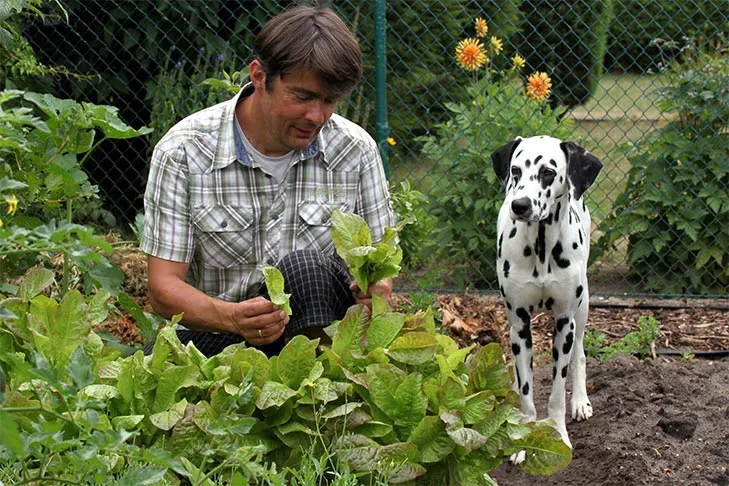Spoiling your beloved canine companion with a bite of your favorite human snack is a common and understandable urge. After all, if it’s safe for you, surely it’s okay for your furry friend, right? Not always. While many human foods are perfectly safe and even beneficial for dogs, others can be very unhealthy or downright dangerous. Understanding What Fruits And Vegetables Are Not Good For Dogs is crucial for every pet owner, as canine digestive systems process foods differently than ours. Ingesting the wrong foods can lead to long-term health problems and, in extreme cases, be fatal. As omnivores, dogs don’t strictly require fruits or vegetables as a core part of their diet. However, offering dog-safe fruits and vegetables as an occasional treat or snack is generally acceptable. This guide will help you navigate which fruits and vegetables are safe to share in moderation and which should be strictly avoided, ensuring your dog’s health and happiness. For a broader understanding of suitable dietary options, learn about what whole foods can dogs eat.
Fruits Dogs Can Eat
Given in moderation, numerous fruits can serve as delicious and healthy treats for dogs, offering essential vitamins, minerals, and beneficial antioxidants. Here are some dog-friendly fruits you can safely share as an occasional snack.
Apples
Apples are an excellent source of vitamins A and C, along with fiber, for your dog. They are low in protein and fat, making them an ideal snack for senior dogs. Always be sure to remove the seeds and core first, as apple seeds contain small amounts of cyanide. For a refreshing warm-weather treat, try them frozen.
Bananas
Bananas are a fantastic low-calorie treat for dogs when given in moderation. They are rich in potassium, various vitamins, biotin, fiber, and copper, while also being low in cholesterol and sodium. However, due to their high sugar content, bananas should be reserved as an occasional treat rather than a main diet component.
Blueberries
Considered a superfood, blueberries are packed with antioxidants that help prevent cell damage in both humans and canines. They also contain significant amounts of fiber and phytochemicals. Blueberries are great for training or as a general healthy snack.
Cantaloupe
Cantaloupe is nutrient-dense, low in calories, and an excellent source of water and fiber. However, its high sugar content means it should be offered in moderation, particularly for dogs who are overweight or have diabetes. Frozen cantaloupe cubes make a refreshing summertime treat.
Cranberries
Both fresh and dried cranberries are safe for dogs in small quantities. While their tartness might not appeal to all dogs, moderation is key, as too many can lead to an upset stomach. Many dried cranberries intended for human consumption are sweetened, adding unnecessary sugar to your dog’s diet. Opt for unsweetened fresh or frozen cranberries if your dog enjoys them.
Cucumbers
Cucumbers are particularly beneficial for overweight dogs due to their minimal carbohydrate and fat content, and their high water content provides satisfying hydration. They are rich in vitamins K, C, and B1, as well as potassium, copper, magnesium, and biotin.
 Russell Terrier funny portrait with cucumber slices
Russell Terrier funny portrait with cucumber slices
Mango
This sweet, juicy tropical fruit is loaded with vitamins A, B6, C, and E, as well as potassium, beta-carotene, and alpha-carotene. Like most fruits with a pit, always remove the hard pit first, as it contains small amounts of cyanide and poses a choking hazard. Mango is high in sugar, so offer it as an occasional treat, especially for dogs prone to weight gain.
Oranges
Oranges are generally safe for dogs to eat, according to veterinarians, though their strong citrus scent and taste often deter canines. They are an excellent source of vitamin C, potassium, and fiber. In small quantities, the juicy flesh (without seeds) can be a tasty treat. Vets recommend discarding the orange peel, as its rough texture can irritate their digestive system, and the oils might be unappealing to their sensitive noses.
Peaches
Small amounts of cut-up fresh or frozen peaches provide a good source of fiber and vitamin A. Crucially, the peach pit contains cyanide, similar to cherries. Ensure the flesh is completely separated from the pit, and dispose of pits securely. Avoid canned peaches due to their high sugar syrup content.
Pears
Pears are a good snack, high in copper, vitamins C and K, and fiber. When sharing pears, cut the flesh into bite-sized chunks and remove the pit and seeds, as they contain traces of cyanide. As with peaches, avoid canned or jarred pears with added sugary syrups.
Pineapple
A few chunks of pineapple can be a sweet treat for dogs, provided the prickly outer peel and crown are removed. This tropical fruit is full of vitamins, minerals, and fiber. It also contains bromelain, an enzyme that aids dogs in absorbing proteins. Again, avoid canned pineapple in sweetened syrups.
Pumpkin
Pure pumpkin is a highly beneficial food for dogs. Rich in antioxidants, its key benefit is its ability to help relieve both diarrhea and constipation in dogs. When buying canned pumpkin, always choose 100% pumpkin puree, or you can roast and peel fresh pumpkin yourself.
Raspberries
Raspberries are safe for dogs in moderation and are rich in antioxidants. They are low in sugar and calories but high in fiber, manganese, and vitamin C. Raspberries are especially good for senior dogs due to their anti-inflammatory properties, which can support aging joints. However, raspberries contain small, naturally occurring amounts of xylitol, so limit your dog to no more than 8 ounces of fresh or frozen raspberries.
Strawberries
Strawberries are full of fiber and vitamin C, and also contain an enzyme that can help whiten your dog’s teeth. Like all fruits, they contain natural sugar, so offer them in moderation. Frozen strawberries can be a fun enrichment treat.
 Pembroke Welsh Corgi sniffing at a strawberry on a blue background
Pembroke Welsh Corgi sniffing at a strawberry on a blue background
Watermelon
Dogs can eat watermelon, but it is critical to remove the rind and seeds first, as they can cause intestinal blockage. The flesh of watermelon is safe and packed with vitamins A, B-6, and C, as well as potassium. Being 92% water, it’s an excellent way to keep your dog hydrated on hot days.
Fruits Dogs Should Avoid
While some fruits are perfectly healthy for humans, they may contain compounds, seeds, or parts that are dangerous, or even toxic, to dogs. It is best to keep these fruits out of your dog’s reach to ensure their safety.
Avocado
Although avocado is a healthy snack for humans, it should not be given to dogs. The pit, skin, and leaves of avocados contain persin, a toxin that frequently causes vomiting and diarrhea in dogs. While the fleshy inside of the avocado fruit has less persin, it can still be too much for dogs. Avocado flesh is also high in fat, which can lead to gastrointestinal upset or contribute to conditions like pancreatitis if consumed in large quantities. If your dog shows signs of discomfort, it might be a good idea to consult this guide on what can my dog eat for an upset stomach.
Cherries
With the exception of the fleshy fruit around the seed, all parts of cherry plants contain cyanide and are toxic to dogs. Cyanide disrupts cellular oxygen transport, meaning your dog’s blood cells cannot get enough oxygen. If you have a cherry tree, prevent your dog from accessing fallen fruit. If your dog eats whole cherries or cherry pits, watch for dilated pupils, difficulty breathing, and red gums, as these are signs of cyanide poisoning and constitute a veterinary emergency. When discarding pits, ensure they are in a dog-proof trash can.
Grapes
If you suspect your dog has eaten grapes or raisins, contact your veterinarian immediately. Grapes and raisins are highly toxic to dogs, regardless of breed, sex, or age. Their toxicity can lead to acute sudden kidney failure. Always be vigilant about this dangerous fruit, especially if children in your home eat grapes or raisins. Dispose of them in a dog-proof trash bin. If your dog has ingested these and is showing signs of illness, it’s crucial to know what can you feed a sick dog and seek veterinary advice.
Tomatoes
While the ripened flesh of a tomato fruit is generally safe for dogs, the green parts of the tomato plant contain a toxic substance called solanine. Although a dog would need to consume a large amount of the plant to become ill, it’s safer to avoid tomatoes altogether. Prevent your dog from accessing tomato plants in your garden.
 Rottweiler laying down in the yard, its head tilted
Rottweiler laying down in the yard, its head tilted
Vegetables Dogs Can Eat
Knowing which vegetables are safe for your dog is essential. Many vegetables offer nutritional benefits, but some can be toxic. Here are some vegetables you can confidently chop up and share with your dog.
Broccoli
Broccoli is safe for dogs in small amounts and is best served as an occasional treat. It is high in fiber and vitamin C and low in fat. However, broccoli florets contain isothiocyanates, which can cause mild to potentially severe gastric irritation in some dogs. Tough broccoli stalks have also been known to cause obstruction. Offering cooked broccoli can help avoid these issues.
Brussels Sprouts
Brussels sprouts are packed with nutrients and antioxidants beneficial for both humans and dogs. However, avoid overfeeding them, as they can cause significant gas. For specific dietary needs or preferences, like understanding what does shih tzu like to eat, always consider the broader context of safe and healthy foods.
Carrots
Carrots are an excellent low-calorie snack, rich in fiber and beta-carotene, which the body converts to vitamin A. The crunchiness of this orange root vegetable is also great for your dog’s teeth. Carrots are a common ingredient in many dog foods and treats.
 Golden Retriever holding carrots
Golden Retriever holding carrots
Celery
In addition to vitamins A, B, and C, celery contains nutrients that promote a healthy heart and may even help fight cancer. Furthermore, celery is known to help freshen a dog’s breath.
Green Beans
Chopped, steamed, raw, or canned – all types of plain green beans are safe for dogs. They are full of important vitamins and minerals, fiber, and are low in calories. Opt for no-salt canned green beans or frozen varieties as enrichment snacks.
Peas
Green peas, snow peas, sugar snap peas, and garden or English peas are all acceptable for dogs occasionally. Peas contain several vitamins, minerals, and are rich in protein and fiber. You can feed fresh or frozen peas, but avoid canned peas with added sodium.
Spinach
Dogs can eat spinach, but it’s not among the top recommended vegetables to share. Spinach is high in oxalic acid, which can hinder the body’s ability to absorb calcium and potentially lead to kidney damage. While a dog would likely need to consume a very large amount to experience problems, it might be best to choose other vegetables instead.
 Dalmatian watching a man gardening and picking leaves
Dalmatian watching a man gardening and picking leaves
Vegetables Dogs Should Avoid
While many vegetables can be a healthy addition to a dog’s diet, others can be toxic or harmful for them to consume. Here are some vegetables that should not make their way into your dog’s bowl. To avoid any dangerous options, it is always helpful to know what veggies should dogs not eat.
Asparagus
Asparagus isn’t necessarily unsafe for dogs, but it offers little benefit. It’s too tough to eat raw, and by the time it’s cooked soft enough for dogs, much of its nutritional value is lost. If you want to share a vegetable, many other options provide better nutritional value.
Mushrooms
Wild mushrooms can be highly toxic to dogs. Although only a small fraction of mushroom species are known to be poisonous, these can cause severe illness or even death. While wild mushrooms are a definite no, washed mushrooms purchased from the supermarket for human consumption are generally considered safe for dogs.
Onions
Dogs should never eat onions. If you suspect your dog has ingested onions, contact your veterinarian immediately. Onions, leeks, and chives are part of the Allium family of plants, which are poisonous to most pets, especially cats. Eating onions can cause your dog’s red blood cells to rupture, and also lead to vomiting, diarrhea, stomach pain, and nausea. Onion poisoning is more serious in Japanese breeds like Akitas and Shiba Inus, but all dogs are susceptible. Ensure children are not sharing foods containing onions with your dog, and secure leftovers where your dog cannot access them.
Conclusion
Understanding what fruits and vegetables are not good for dogs is vital for every responsible pet parent. While it’s tempting to share your favorite human snacks, recognizing which ones are safe and which are dangerous can significantly impact your dog’s health and well-being. Always prioritize your dog’s safety by removing pits, seeds, and potentially toxic parts from any fruit or vegetable you offer. For a comprehensive diet, always consult your veterinarian to ensure your dog receives the best nutrition tailored to their specific needs. By being informed and cautious, you can provide your canine companion with a variety of healthy treats while avoiding harmful substances.
